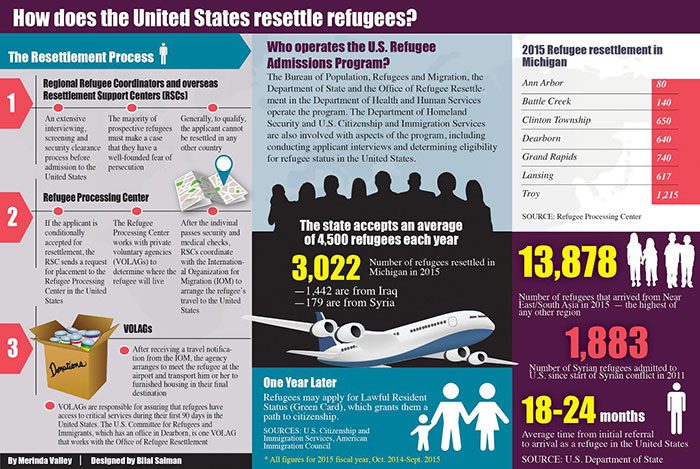
Conflicts in the Middle East and other parts of the world are causing an extreme exodus. People are fleeing war-torn countries and struggling to find safety within other nation’s borders. The war in Syria alone has displaced more than 12 million people since it began in 2011.
The United States has committed to accepting more refugees over the next two years, as Secretary of State John Kerry announced last month, but a considerable number of politicians, humanitarian organizations and citizens are urging the government to do more.
Michigan has been one of the top states for settling refugees since 2007, according to the Office of Refugee Resettlement. It was also a primary resettlement location from Oct. 1, 2014 through Sept. 30, 2015, the 2015 fiscal year.
In that time, about 3,022 asylum-seekers were resettled in Michigan. But many others are still searching for a place to relocate. In comparison, 20,000 refugees arrived in Munich, Germany in a single weekend recently.
Dave Murray, deputy press secretary for Gov. Snyder, said Michigan’s Arab population is one reason the state is a good place for refugees to settle.
“Often, people will relocate in other states and make their way to Michigan anyway just because of the (Arab) concentration that we have or because they have family and friends here,” Murray said.
According to Murray, Michigan receives an average of $3 million to $3.5 million annually from the federal government for refugee assistance.
He said Michigan is a welcoming state and added that people who bring their talents can benefit the state.
“We know that many of the refugees are highly skilled people,” Murray said.
He added that statistics show refugees who specialize in the STEM fields (science, technology, engineering and math) create jobs in the states where they resettle.
“This makes us stronger and it helps people who are in need,” Murray said.
The U.S. Committee for Refugees and Immigrants is one of the voluntary agencies that cooperates with the Office of Refugee Resettlement to help refugees adjust to their new environments.
Tawfik Alazem, the director of the Detroit field office, said there are many considerations when resettling refugees, but the chief concern is whether the area is culturally appropriate.
He said Dearborn’s large Arab community makes it an ideal destination.
“There are so many people speaking the same language — whether Iraqi or Syrian,” Alazem said. “There are many shops, many restaurants and, of course, there are good schools that have many Arabic-speaking teachers and employees.”
Rasha Basha, a volunteer with several community organizations, has years of experience assisting refugees with their immediate needs.
“We give them support and everything possible from housing to as far as ESL classes, food, emotional support, doctor appointments— anything basically you can think of that someone moving all the way to this country would need help with,” Basha said.
She said she has assisted about 25 Syrian refugee families who arrived in Southeast Michigan since May.
Other community organizations such as ACCESS and the Arab American and Chaldean Council offer job training, medical care and other services to refugees that can extend beyond their first 90 days in the United States.






Leave a Reply